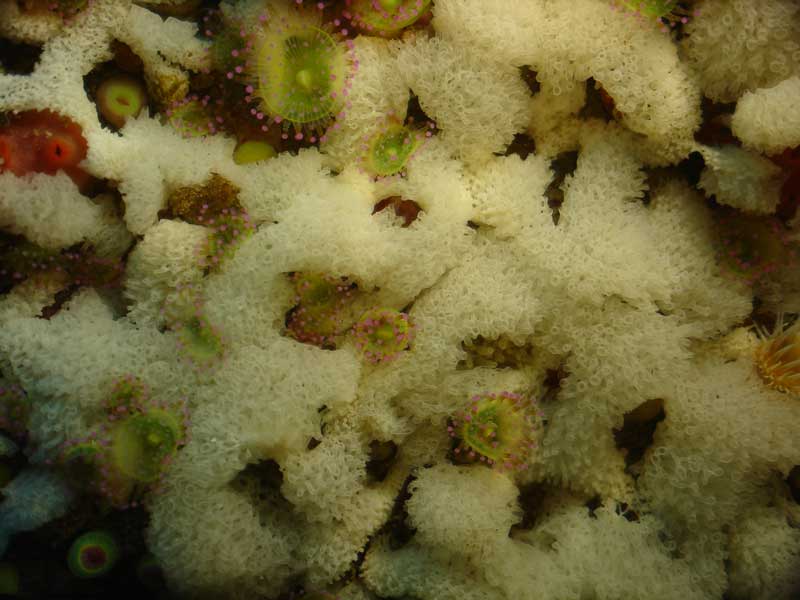White lace sponge (Clathrina coriacea)
Distribution data supplied by the Ocean Biodiversity Information System (OBIS). To interrogate UK data visit the NBN Atlas.Map Help
| Researched by | Megan Maleed | Refereed by | This information is not refereed |
| Authority | (Montagu, 1814) | ||
| Other common names | - | Synonyms | Spongia coriacea (Montagu, 1814) |
Summary
Description
A delicate encrusting sponge, typically white but occasionally grey, pale rose/yellow, orange, or lemon yellow. It is characterized by a network of thin tubes (approx. 1 mm in diameter). The tubes create patches on vertical bedrock ranging from 1 to 2 cm to 30 cm in size, creating mounds with visible exhalent openings (oscules) on the top. This sponge is often found alongside the sea squirt Dendrodoa grossularia in tide-swept areas.
Recorded distribution in Britain and Ireland
Widespread in Britain and Ireland.
Global distribution
Widespread in Britain and Ireland. Scattered records in the North Sea off the coast of Norway, the western Mediterranean and in the Aegean Sea by Turkey. Also recorded along the east Atlantic coast of the USA, the Gulf of Mexico, the Gulf of Honduras, the Caribbean Sea, off the coast of Venezuela, and in southern California on the Pacific coast of the USA. Scattered records in South Africa and Northern Africa via the Mediterranean, and in the Southern Ocean, Bay of Bengal, and off the coast of eastern Australia.
Habitat
Found on the lower shore attached, usually hidden underneath bedrock, or on vertical infralittoral rock in gullies with strong wave action. Also occurs in sheltered habitats such as caves or overhangs. Primarily a shallow water species although some individuals were recorded at greater depths.
Depth range
0-40 m (possibly up to 190 m)Identifying features
- Typically, white in colour
- Spikey looking
- Mesh-like, composed of intertwined thin tubes
- No erect branches
- Soft and delicate
Additional information
It resembles Clathrina lacunosa and Leucosolenia spp., which are also composed of thin tubes. Clathrina lacunosa can be differentiated by its stalk. Local species of Leucosolenia spp. typically form oval balls rather than crusts, exhibiting a bushier appearance with protruding tubes. Some bryozoans look similar but are characterized by their hardness. Although several other Clathrina species exhibit similar traits, most are currently believed to be absent from British and Irish waters. However, further research may reveal that many forms currently identified as Clathrina coriacea are, in fact, distinct species of their own (Bowen et al., 2018)
Listed by
- none -
Bibliography
Ackers, R.G.A., Moss, D. & Picton, B.E. 1992. Sponges of the British Isles (Sponges: V): a colour guide and working document. Ross-on-Wye: Marine Conservation Society.
Bowen. S., Goodwin. C., Kipling. D. & Picton. B., 2018. Sea Squirts and Sponges of Britain and Ireland, Seasearch Guide. Plymouth: Wild Nature Press.
Hayward, P.J. & Ryland, J.S. (ed.) 2017. Handbook of the marine fauna of North-West Europe. Oxford: Oxford University Press.
Picton, B.E., Morrow, C.C. & van Soest, R.W.B., 2007. [In] Sponges of Britain and Ireland: http://www.habitas.org.uk/marinelife/sponge_guide/sponges.asp?item=C2134
Van Soest, R.W.M., Picton, B. & Morrow, C., 2024. Sponges of the North East Atlantic, 2.0. Leiden, Netherlands: Linnaeus NG - Naturalis Biodiversity Center. Accessed [2024-10-04]. Available from https://sponges-ne-atlantic.linnaeus.naturalis.nl/linnaeus_ng/app/views/introduction/topic.php?id=3392&epi=168
Datasets
Manx Biological Recording Partnership, 2022. Isle of Man historical wildlife records 1990 to 1994. Occurrence dataset:https://doi.org/10.15468/aru16v accessed via GBIF.org on 2024-09-27.
NBN (National Biodiversity Network) Atlas. Available from: https://www.nbnatlas.org.
OBIS (Ocean Biodiversity Information System), 2025. Global map of species distribution using gridded data. Available from: Ocean Biogeographic Information System. www.iobis.org. Accessed: 2025-08-08
South East Wales Biodiversity Records Centre, 2023. SEWBReC Marine and other Aquatic Invertebrates (South East Wales). Occurrence dataset:https://doi.org/10.15468/zxy1n6 accessed via GBIF.org on 2024-09-27.
Citation
This review can be cited as:
Last Updated: 30/09/2024



